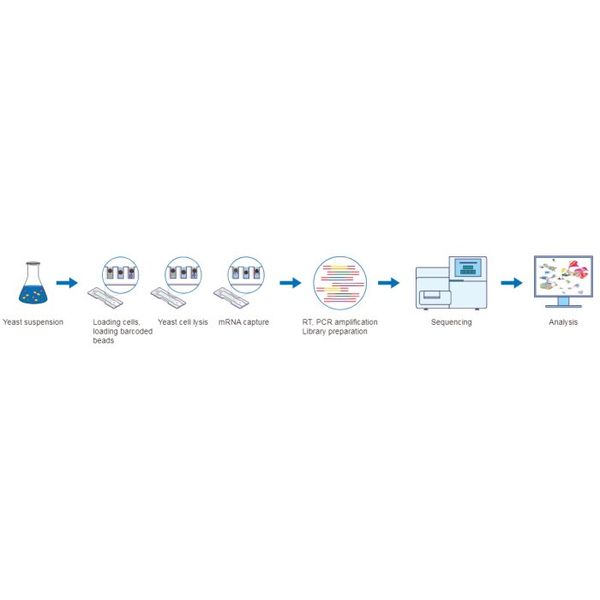

- Home
- Companies
- Singleron Biotechnologies GmbH
- Products
- Gexscope - Microbial Single Cell RNA ...
Gexscope - Microbial Single Cell RNA Library Kit HD (Yeast)
Single-cell RNA technologies have rarely been adapted to microorganisms because of challenges related to their size, lower RNA content within a single cell and strict lysis requirements. Singleron developed the first commercially available product to enable high throughput single-cell RNA-Seq from yeast models. This novel technology enables researchers, pathologists, food industries and fermentation businesses to study stochastical variations of gene expression in yeast population through single-cell sequencing with reliable and standardized results.
GEXSCOPE® Microbial Single Cell RNA Library Kit (Yeast) is ideally suited to study heterogeneity within a microbial yeast population. This kit offers the complete solution to generate single-cell sequencing ready libraries within one day starting from fixed or fresh cells. The kit includes Singleron’s proprietary SCOPE® chips for cell partitioning and AccuraCell® beads for unique cell barcoding, an optimized lysis buffer for the digestion of the yeast cell wall, as well as enzymes, buffers, and indices for cDNA and sequencing library generation. The kit was optimized to capture over 30 000 single cells per chip and is compatible with a fully automated cell parsing instrument.
Specially designed for yeast
The GEXSCOPE® Microbial Single Cell RNA Library Kit HD (Yeast) was optimized towards the high capture efficiency of the yeast transcriptome. As depicted below, the enhanced lysis reagents enables the cell wall digestion and a greater access to the RNA content.
Figure: Comparison of cDNA profiles on Agilent TapeStation generated from standard single cell sequencing kit (A) and optimized microbial single cell kit (B).
- Easy to use: All-in-one solution developed and tested for yeast studies
- High throughput: Sequence 500-30.000 yeast single-cells per chip
- Fast: From sample to sequencing library within one working day
- Wide area of applications: From basic yeast research to tailoring yeast cells for industry

- Environmental population and phylogeny research; discovery of new species
- Obtain gene expression data to support your cellular engineering project
- Analyze the response to stress and environmental shifts
- Study pathological yeast involved in human infectious diseases
